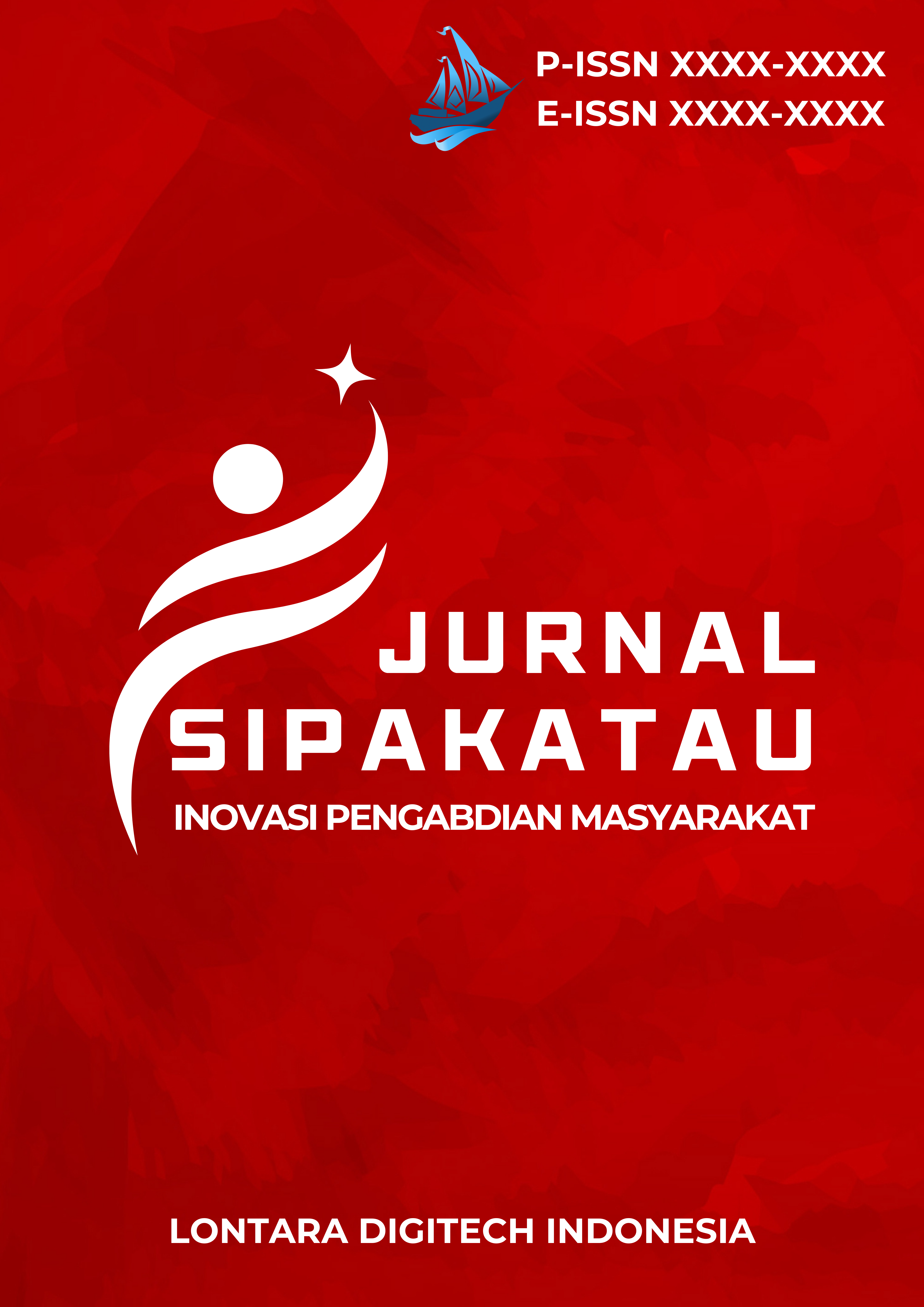Beyond Advice: Training Mentors in Ethics, Boundaries, and Trustworthy Mentoring
DOI:
https://doi.org/10.61220/jsipakatau.v2i4.2525Keywords:
ethical boundaries, ethical mentoring, mentoring relationship, mentor training, professional integrityAbstract
The Community Service Program aims to improve ethical competency among student mentors through a structured training program that focuses on five key areas: confidentiality, ethical communication, communication style, professional boundaries, and respecting mentee diversity. A total of 31 mentors participated in pre- and post-test assessments, allowing for a measurable analysis of knowledge development. The training was delivered online using Zoom and included interactive discussions, scenario analysis, and self-reflection sessions. Results showed significant improvements in all five indicators, particularly in understanding ethical communication (from 32.3% to 77.4% selecting the highest score), and appropriate communication style (from 41.9% to 80.6%). Even dimensions with high baseline scores, such as confidentiality (74.2%), experienced positive growth. The findings confirm that the training successfully improved participants’ ethical sensitivity, practical communication skills, and preparedness for real-world mentoring situations. This initiative contributed to the development of a responsible mentoring culture that aligns with the values of empathy, professionalism, and inclusion. Future programs should consider expanding to include peer mentors from other faculties and provide ongoing support mechanisms to strengthen ethical mentoring practices.
References
Adebayo, B. O., & Sunderman, H. M. (2023). Intercultural Mentoring in Higher Education. Journal of Leadership Studies, 17(3), 66–73. https://doi.org/10.1002/jls.21868
Bear, S., & Jones, G. E. (2016). Students as Protégés. Organizational Behavior Teaching Review, 41(1), 146–168. https://doi.org/10.1177/1052562916658688
Berry, C., Phelan, E., & Michelson, D. (2022). “Weird Duality”: Learning From Peer Mentors’ Experiences of Supporting Student Mental Health During the COVID-19 Pandemic. https://doi.org/10.31234/osf.io/hx3pg
Briggle, A., Holbrook, J. B., Oppong, J. R., Hoffmann, J., Larsen, E. K., & Pluscht, P. (2015). Research Ethics Education in the STEM Disciplines: The Promises and Challenges of a Gaming Approach. Science and Engineering Ethics, 22(1), 237–250. https://doi.org/10.1007/s11948-015-9624-6
Elran‐Barak, R., & Elmalah-Alon, S. (2024). Moving Between Positions: A Qualitative Study of Mentoring Relationships in Chronic Eating Disorders. Journal of Eating Disorders, 12(1). https://doi.org/10.1186/s40337-024-01007-x
Fleig-Palmer, M. M., & Schoorman, F. D. (2011). Trust as a Moderator of the Relationship Between Mentoring and Knowledge Transfer. Journal of Leadership & Organizational Studies, 18(3), 334–343. https://doi.org/10.1177/1548051811408615
Hastings, L. J., & Sunderman, H. M. (2020). Evidence‐Based Practices in Mentoring for Leadership Development. New Directions for Student Leadership, 2020(168), 75–84. https://doi.org/10.1002/yd.20410
Hu, Z., Kwan, H. K., Zhang, Y., & Li, J. (2024). The Effects of Negative Mentoring Experiences on Protégés’ Turnover Intention: The Roles of Harmonious Work Passion and moqi With the Mentor. Journal of Managerial Psychology, 39(6), 716–731. https://doi.org/10.1108/jmp-01-2023-0017
Johnson, W. B., Long, S., Smith, D. G., & Griffin, K. A. (2023). Creating a Mentoring Culture in Graduate Training Programs. Training and Education in Professional Psychology, 17(1), 63–70. https://doi.org/10.1037/tep0000404
Keller, T. E., Drew, A. L., Herrera, C., Clark‐Shim, H., & Spencer, R. (2023). Do Program Practices Matter for Mentors?: How Implementation of Empirically Supported Program Practices Is Associated With Youth Mentoring Relationship Quality. Journal of Community Psychology, 51(8), 3194–3215. https://doi.org/10.1002/jcop.23019
Luo, L., & Stoeger, H. (2023). Unlocking the Transformative Power of Mentoring for Youth Development in Communities, Schools, and Talent Domains. Journal of Community Psychology, 51(8), 3067–3082. https://doi.org/10.1002/jcop.23082
Mabrouk, P. A. (2015). What Knowledge of Responsible Conduct of Research Do Undergraduates Bring to Their Undergraduate Research Experiences? Journal of Chemical Education, 93(1), 46–55. https://doi.org/10.1021/acs.jchemed.5b00264
Mader, M., Stoeger, H., Veas, A., & Ziegler, A. (2021). How Mentors Think About the Attainability of Mentoring Goals: The Impact of Mentoring Type and Mentoring Context on the Anticipated Regulatory Network and Regulatory Resources of Potential Mentors for School Mentoring Programs. Frontiers in Psychology, 12. https://doi.org/10.3389/fpsyg.2021.737014
Molitor, S., Parker, L., & Vetter, D. (2018). Mentoring for All: Building Knowledge and Community. Journal of Professional Capital and Community, 3(4), 242–255. https://doi.org/10.1108/jpcc-12-2017-0035
Pollard, R., & Kumar, S. (2021). Mentoring Graduate Students Online: Strategies and Challenges. The International Review of Research in Open and Distributed Learning, 22(2), 267–284. https://doi.org/10.19173/irrodl.v22i2.5093
Qian, J., Xiao-song, L., Han, Z. R., Chen, Z. X., & Hays, J. (2014). What Matters in the Relationship Between Mentoring and Job-Related Stress? The Moderating Effects of Protégés’ Traditionality and Trust in Mentor. Journal of Management & Organization, 20(5), 608–623. https://doi.org/10.1017/jmo.2014.46
Rabin, C. (2019). Co-Teaching: Collaborative and Caring Teacher Preparation. Journal of Teacher Education, 71(1), 135–147. https://doi.org/10.1177/0022487119872696
Rowe-Johnson, M. (2018). Achieving Ethical Mentoring and Mentee Professional Integrity Through Formal Mentor Training for Practicing Psychologists. Training and Education in Professional Psychology, 12(3), 203–209. https://doi.org/10.1037/tep0000198
Sabah, S., & Marei, S. T. (2024). The Mentoring Experience of Jordanian Pre-Service Science Teachers. International Journal of Education and Practice, 12(3), 622–631. https://doi.org/10.18488/61.v12i3.3739
Sheri, K., Too, J. Y. J., Chuah, S. E. L., Toh, Y. P., Mason, S., & Krishna, L. K. R. (2018). A Scoping Review of Mentor Training Programs in Medicine Between 1990 and 2017. Medical Education Online, 24(1), 1555435. https://doi.org/10.1080/10872981.2018.1555435
Son, S., & Kuchinke, K. P. (2015). The Moderating Role of Trust in Formal Mentoring Relationships in Korea. Asia Pacific Journal of Human Resources, 54(1), 57–78. https://doi.org/10.1111/1744-7941.12077
Sunderman, H. M., & Orsini, J. (2023). Introduction to Leading From the Middle in Higher Education: Mentoring. Journal of Leadership Studies, 17(3), 40–44. https://doi.org/10.1002/jls.21869
Thornton, K. (2024). Mentoring Preparation in Educational Contexts: A Review Of the Literature. International Journal of Mentoring and Coaching in Education, 13(4), 441–456. https://doi.org/10.1108/ijmce-07-2023-0069
Downloads
Published
Citation
Issue
Section
License
Copyright (c) 2025 Dewi Fatmarani Surianto, Asmaul Husnah Nasrullah, Ayu Hasnining, Fhatiah Adiba (Author)

This work is licensed under a Creative Commons Attribution-ShareAlike 4.0 International License.
















 Email: sipakatau@lontaradigitech.com
Email: sipakatau@lontaradigitech.com
